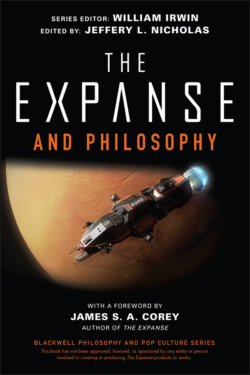Читать книгу The Expanse and Philosophy - Группа авторов - Страница 17
The Abyss Looks Back (Nietzsche Warned You …)
ОглавлениеWhat do you see when you look over The Expanse? Holden sees hope and the need to struggle for justice. Miller sees a quest to find the real Julie Mao. Avasarala sees nothing but the coming of an eventual existential threat to human life. Fred Johnson sees the possibility of redemption. The Mormons, the need for a journey to find God.
For Blaise Pascal (1623–1662), the infinite space discovered by the new physics of the seventeenth century was a terrifying emptiness—proof of the insignificance of human life and the need for faith in God. (He is in both Avasarala’s camp and the Mormons, perhaps.) He writes, “For, after all, what is man in nature? A nothing compared to the infinite, a whole compared to the nothing, a middle point between all and nothing, infinitely remote from an understanding of the extremes; the end of things and their principles are unattainably hidden from him in impenetrable secrecy.”3 When you think about something infinitely large, like the universe, are human beings not a “nothing compared to the infinite”? And, when you think about the fact that the molecular, atomic, and subatomic world is infinitely small, are human beings not “a whole compared to the nothing, a middle point between all and nothing”?
Our place as rational creatures would seem to put us in a position of distinction in all of this infinity. But, “the end of things and their principles are unattainably hidden from [us] in impenetrable secrecy.” Pascal believes that, despite our scientific achievements, reason cannot seem to see what the goal of life is, what the principles that govern human behavior are, or what the ultimate point of our actions is. For Pascal, science gave us power over the “middle” of things but no insight into the meaning of infinity. It is strange to think that we spend our lives reasoning about what is to be done, how we will prosper, how we will serve the community and our fellow human beings, but do not have rationally justified ends to order our actions.
Put another way, practical reasoning (the thinking we do when we are deciding to act) is both extremely difficult to do well and the most commonly successful activity engaged in by human beings. While the details of the context in which we reason can be excruciating to master, and our own desires, prejudices, vanity, and other flaws can obscure the thing that we should do—somehow much practical reasoning gets done successfully.
For philosophers, the general formula is relatively simple. We analyze thinking, character, context, the moral ideas applied (rules, duties or virtues, for instance), the end pursued, and then we evaluate any consequences. What is startling to think about for the characters in The Expanse is that the formula is truncated, decapitated really—or at least missing a limb. “The end of things and their principles are unattainably hidden from [us] in impenetrable secrecy.” In other words, despite our new scientific achievement, knowing whether our actions are right, wrong, foolish, or wise in this new universe of the seventeenth and twenty‐fourth centuries is impossible.
Avasarala understands this problem. She is nobody’s fool and wants to be wise. Her argument with Nancy Gao over the issue of whether to allow “a new gold rush” of humans into the Ring System shows her concern for the lack of knowledge and information surrounding any decision about the Ring. During their tense exchange, Avasarala warns that, like the Yukon before it, this gold rush will result in piles of body bags with “more fools ready to line up and take their place” (“New Terra”). This issue will eventually cost her the election to United Nations Secretary General—Gao’s hopeful view of the possibilities inherent in the Ring will sway voters. The tragedy of Avasarala’s political fortunes is that she will never know enough to make an informed decision on the meaning of the Ring System for human beings. She tries to be wise; yet, even as she recruits Holden to make the trip to New Terra, we can see Pascal shaking his head at the futility of it all. “The ends are hidden in impenetrable secrecy …”
What had changed in the universe for Pascal? Before Galileo and Newton, the prevailing understanding of the universe was that its purpose, the point of why anything existed at all, was so that human beings could live as rational beings who could find their way to God. We were the point. The universe was a small place centered on the earth and human life. It was a stage on which the drama of human life played out. God was understood to intervene directly at times in that drama. What is the point of life in Newton’s universe? Pascal writes, “When I consider the short span of my life absorbed into the preceding and subsequent eternity, memoria hospitis unius diei praetereuntis [like the memory of a one‐day guest (Wisdom 5:15)], the small space which I fill and even can see, swallowed up in the infinite immensity of spaces of which I know nothing and which knows nothing of me, I am terrified, and surprised to find myself here rather than there, for there is no reason why it should be here rather than there, why now rather than then. Who put me here? On whose orders and on whose decision have this place and this time been allotted to me?”4 For Pascal, this new sense of infinity makes everything we do and are seem random and capricious.
What is the point of an infinitely small human life in this infinitely large Expanse?
